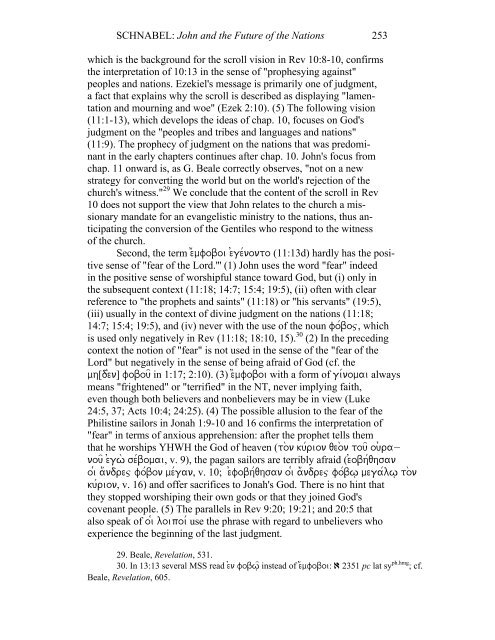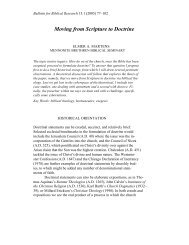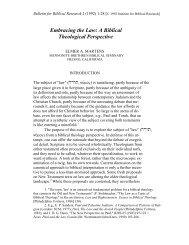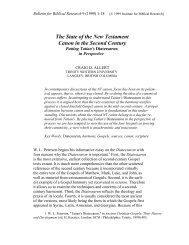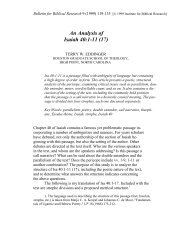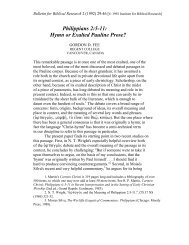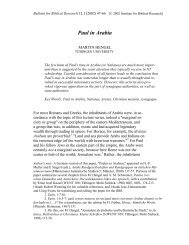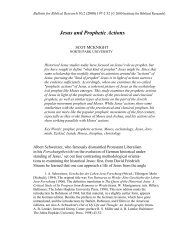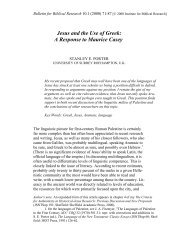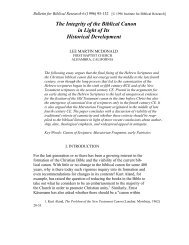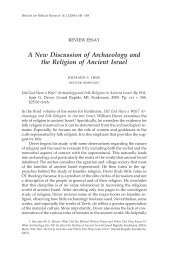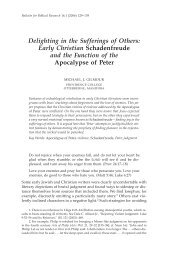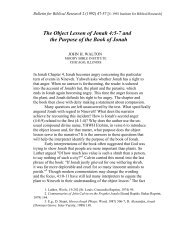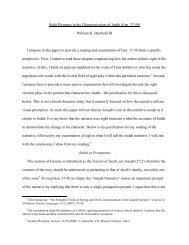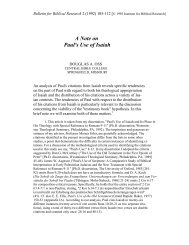John and the Future of the Nations - Institute for Biblical Research
John and the Future of the Nations - Institute for Biblical Research
John and the Future of the Nations - Institute for Biblical Research
You also want an ePaper? Increase the reach of your titles
YUMPU automatically turns print PDFs into web optimized ePapers that Google loves.
SCHNABEL: <strong>John</strong> <strong>and</strong> <strong>the</strong> <strong>Future</strong> <strong>of</strong> <strong>the</strong> <strong>Nations</strong> 253<br />
which is <strong>the</strong> background <strong>for</strong> <strong>the</strong> scroll vision in Rev 10:8-10, confirms<br />
<strong>the</strong> interpretation <strong>of</strong> 10:13 in <strong>the</strong> sense <strong>of</strong> "prophesying against"<br />
peoples <strong>and</strong> nations. Ezekiel's message is primarily one <strong>of</strong> judgment,<br />
a fact that explains why <strong>the</strong> scroll is described as displaying "lamentation<br />
<strong>and</strong> mourning <strong>and</strong> woe" (Ezek 2:10). (5) The following vision<br />
(11:1-13), which develops <strong>the</strong> ideas <strong>of</strong> chap. 10, focuses on God's<br />
judgment on <strong>the</strong> "peoples <strong>and</strong> tribes <strong>and</strong> languages <strong>and</strong> nations"<br />
(11:9). The prophecy <strong>of</strong> judgment on <strong>the</strong> nations that was predominant<br />
in <strong>the</strong> early chapters continues after chap. 10. <strong>John</strong>'s focus from<br />
chap. 11 onward is, as G. Beale correctly observes, "not on a new<br />
strategy <strong>for</strong> converting <strong>the</strong> world but on <strong>the</strong> world's rejection <strong>of</strong> <strong>the</strong><br />
church's witness." 29 We conclude that <strong>the</strong> content <strong>of</strong> <strong>the</strong> scroll in Rev<br />
10 does not support <strong>the</strong> view that <strong>John</strong> relates to <strong>the</strong> church a missionary<br />
m<strong>and</strong>ate <strong>for</strong> an evangelistic ministry to <strong>the</strong> nations, thus anticipating<br />
<strong>the</strong> conversion <strong>of</strong> <strong>the</strong> Gentiles who respond to <strong>the</strong> witness<br />
<strong>of</strong> <strong>the</strong> church.<br />
Second, <strong>the</strong> term e!mfoboi e)ge/nonto (11:13d) hardly has <strong>the</strong> positive<br />
sense <strong>of</strong> "fear <strong>of</strong> <strong>the</strong> Lord.''' (1) <strong>John</strong> uses <strong>the</strong> word "fear" indeed<br />
in <strong>the</strong> positive sense <strong>of</strong> worshipful stance toward God, but (i) only in<br />
<strong>the</strong> subsequent context (11:18; 14:7; 15:4; 19:5), (ii) <strong>of</strong>ten with clear<br />
reference to "<strong>the</strong> prophets <strong>and</strong> saints" (11:18) or "his servants" (19:5),<br />
(iii) usually in <strong>the</strong> context <strong>of</strong> divine judgment on <strong>the</strong> nations (11:18;<br />
14:7; 15:4; 19:5), <strong>and</strong> (iv) never with <strong>the</strong> use <strong>of</strong> <strong>the</strong> noun fo/boj, which<br />
is used only negatively in Rev (11:18; 18:10, 15). 30 (2) In <strong>the</strong> preceding<br />
context <strong>the</strong> notion <strong>of</strong> "fear" is not used in <strong>the</strong> sense <strong>of</strong> <strong>the</strong> "fear <strong>of</strong> <strong>the</strong><br />
Lord" but negatively in <strong>the</strong> sense <strong>of</strong> being afraid <strong>of</strong> God (cf. <strong>the</strong><br />
mh[de_n] fobou= in 1:17; 2:10). (3) e!mfoboi with a <strong>for</strong>m <strong>of</strong> gi/nomai always<br />
means "frightened" or "terrified" in <strong>the</strong> NT, never implying faith,<br />
even though both believers <strong>and</strong> nonbelievers may be in view (Luke<br />
24:5, 37; Acts 10:4; 24:25). (4) The possible allusion to <strong>the</strong> fear <strong>of</strong> <strong>the</strong><br />
Philistine sailors in Jonah 1:9-10 <strong>and</strong> 16 confirms <strong>the</strong> interpretation <strong>of</strong><br />
"fear" in terms <strong>of</strong> anxious apprehension: after <strong>the</strong> prophet tells <strong>the</strong>m<br />
that he worships YHWH <strong>the</strong> God <strong>of</strong> heaven (to_n ku/rion qeo_n tou= ou)ranou=<br />
e)gw_ se/bomai, v. 9), <strong>the</strong> pagan sailors are terribly afraid (e)obh/qhsan<br />
oi( a!ndrej fo/bon me/gan, v. 10; e)fobh/qhsan oi( a!ndrej fo/bw| mega/lw| to_n<br />
ku/rion, v. 16) <strong>and</strong> <strong>of</strong>fer sacrifices to Jonah's God. There is no hint that<br />
<strong>the</strong>y stopped worshiping <strong>the</strong>ir own gods or that <strong>the</strong>y joined God's<br />
covenant people. (5) The parallels in Rev 9:20; 19:21; <strong>and</strong> 20:5 that<br />
also speak <strong>of</strong> oi( loipoi/ use <strong>the</strong> phrase with regard to unbelievers who<br />
experience <strong>the</strong> beginning <strong>of</strong> <strong>the</strong> last judgment.<br />
29. Beale, Revelation, 531.<br />
30. In 13:13 several MSS read e)n fobw|= instead <strong>of</strong> e!mfoboi: ) 2351 pc lat sy ph.hmg ; cf.<br />
Beale, Revelation, 605.


